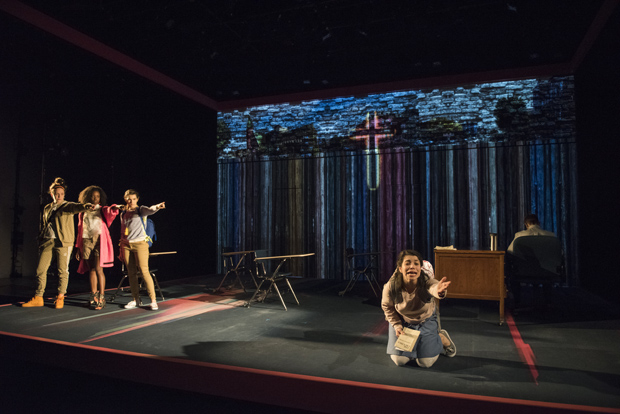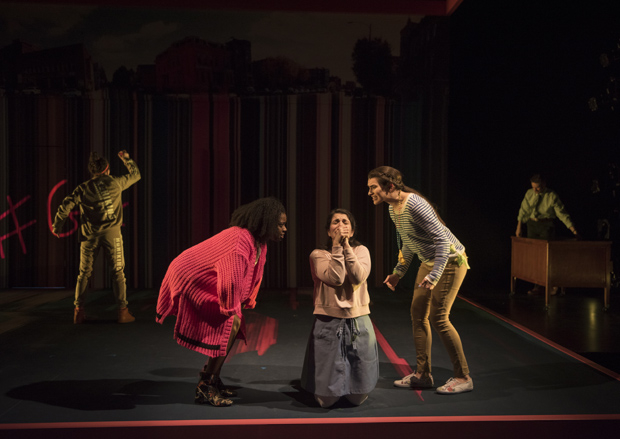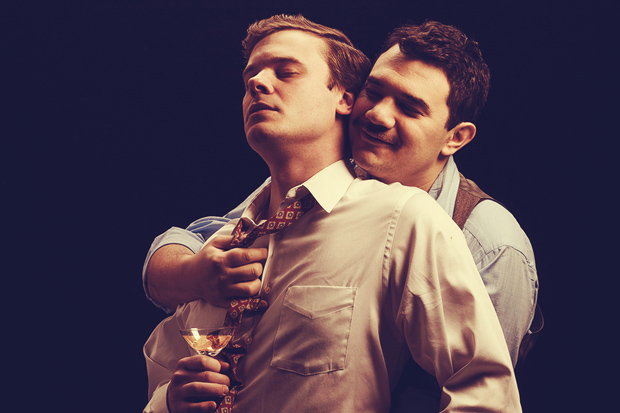The Truth About Witches, Sick Burns, and the New Philip Dawkins Play
The Chicago playwright discusses his latest production at Steppenwolf, ”The Burn”, and his upcoming play, ”The Gentleman Caller”.

(© Michael Brosilow)
"Supposedly, if you didn’t burn, that meant you were a witch, and then I guess they were like, 'Great, she’s a witch. Now what?' But, if you did burn — and this is where it gets like all kinds of crazy water-boarding mentality — if you did burn, then they’d be all 'Oh, guess she was just a regular old human after all. Sorry not sorry.' "
That's how high school student Tara Swansen explains the medieval practice of witch burning in Philip Dawkins's latest play, The Burn, which is now making its world premiere at Steppenwolf. It's about a group of high school students rehearsing a production of The Crucible. As the play progresses, they get caught up in their own online conflagration, culminating in a series of violent threats posted to Facebook. It made me wonder what the denizens of Salem circa 1692 would post if they had access to social media, which Dawkins has obviously considered too.
"I think the Puritans are on Twitter and Facebook," retorts Dawkins, who is as witty and thoughtful in conversation as he is in his plays.
One of Chicago's leading playwrights, Dawkins made his New York debut earlier this season with Charm, which told the story of a trans elder who tries to impart the wisdom of Emily Post on the youths at Chicago's LGBT Center. He returns to New York in May with The Gentleman Caller, about the relationship between the playwrights William Inge and Tennessee Williams. That play makes its world premiere in March at Chicago's Raven Theatre. Dawkins offered the following answers to our burning questions:

(© Michael Brosilow)
Where did you get the idea for The Burn?
I started writing this three years ago based on something that happened to a student of mine at a high school where I was a teaching artist. I walked in one day and the one student who had been doing a nice amount of writing wasn't there anymore, so I asked the classroom teacher where she was. He said she got expelled. He explained how she was being bullied in real life and a little bit more adeptly online, and that she just didn't have quite the agility in her online response that the other girls did. So she went down for it. I just thought that was so tragic because even though what she did was destructive, it was also creative. I wish we could have held on to her and said, "Let's take these creative impulses and put them toward something valuable." But we lost her because the authorities came in and took her out.
That seems like the safer choice considering the fear around school shootings.
Well, as in my play, this girl is a person of color. She came from a family with gang activity in it. And I think that those kids are targeted by the authorities and they're watched closer.
In the play you've also made this bullied girl, Mercedes, a devout Christian. Why?
To flip the script on what you see in theater quite a bit. I wanted her to be somebody a super liberal audience could look at and say, "Oh yes, that person is wrong. Maybe that person's a little homophobic; maybe that person has a narrow mindset." Something that I notice a lot in the zeitgeist and online publics is the notion that that if somebody is wrong about anything, then that suddenly allows you to be as awful and nasty to them as you want. And I just don't think that's helpful.
Are you on social media?
I'm on Facebook, but I only check it on Fridays. I think social media is a tool and there's nothing inherently good or bad about tools. Tools are there for us to use. You can use a hammer to build a house for someone who needs it, or you can use a hammer to murder somebody. I was going on Facebook and getting sad watching people murder each other with hammers. Now I make a little list on a sticky note of things I need to do on Facebook. I open it up Friday morning. I get in, I get out, and I'm done. So I didn't shut out the news or anything like that. I just exited the yelling chamber.

(© Christopher Semel)
I loved Charm, which was your New York debut. You're coming back in May with The Gentleman Caller at Abingdon Theatre Company. What interested you about the relationship between William Inge and Tennessee Williams?
It was a physical interest. I did the William Inge Center residency where you go and live in his childhood home and teach high school. So I lived in Independence, Kansas, for two and a half months in the house that Picnic is about, and I was in close proximity with the Inge archives when I came across this story. When I read about their relationship, I was like, "Wait…how is this not an opera already?" It became a deep fascination for me. I'm so taken by the ability of queer people to find each other throughout history, especially when everyone has tried to annihilate us. Williams and Inge found each other and were able to say, "No, I see beauty in you. I see necessity in you; and whatever we are, we're beautiful and we're worth it." They ended up saving each other's lives for years and years and years — until they destroyed themselves.
Is there a unifying theme in the stories that you want to tell onstage?
Empathy and compassion are the things that drive me the most. And I almost always have just at least a little bit of romance. I can't make it through a story if someone's not in love — even if it's a kid in love with a teddy bear. That'll do.









